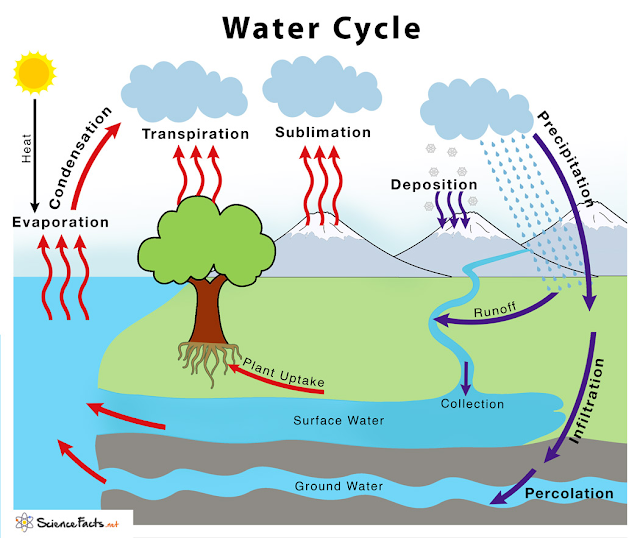Perhaps it's just that I have lots of time to stare out the window, but I'm fascinated by how snow disappears around here without my seeing much of a 'melt'. It's a partly sunny day here, and 6°C, but I don't see any snow melting into water and running down the edge of the road. And yet the patches of green in our front yard keep getting bigger, so the snow is going somewhere.
The first place that snow goes is probably down into the soil. Snow in our front yard is 'melting' from the top down. Surface crystals melt and the structure of the snow changes, the water trickling down inside the snowpack until it reaches the soil. The snowpack thus becomes thinner and denser. Of course freezing temperatures at night refreeze the snowpack, leaving it crunchy underfoot the next morning.
At least some of the melting snow that goes straight down into the soil will recharge the groundwater, and I can be sure that at least a few molecules of that water will seep sideways and recharge the stream that flows 200 yards away. In fact much of the higher stream level that we see in the spring may come from groundwater seepage rather than surface run-off.
But snow is disappearing the opposite direction as well, 'sublimating' directly into the air.
(Credit to the Science Facts website)This is one of the few diagrams of the water cycle I've found that actually shows 'sublimation'. It's the change of solids into a gas directly, such as the change of snow crystals into water vapour directly. You can see it on an early morning drive in the right atmospheric conditions, in the form of water vapour or fog hovering over the fields.
Scientists have not found an easy way to measure sublimation, and it's invisible so that's why you probably don't think of it much. One place you can see it is in chinook winds on the prairies. Chinook winds come in off the Pacific, dump all their moisture on the west side of the coast mountains and then descend onto the prairies (think Calgary) hungry for moisture. They just sunk up the snow as fast as they can go.
Scientists don't actually know how much sublimation contributes to snow disappearance, but by my own observations and reading during a typical spring at least half the snow 'melting' will be due to sublimation rather than the typical 'melt'. So this spring watch for those days when the snow just seems to vanish and see if you don't agree with me.

Well, that's cheered me up no end - saw your title and the word "sublimation" not only popped into my mind but I knew exactly what it meant. That "Piggy" Bryan must have been one helluva geography teacher for that to stick in my mind for over half a century; it's not the kind of thing that comes up in conversation very often!
ReplyDeleteIt is comforting seeing the end of winter! We are ready for it.
ReplyDeleteI do agree about sublimation. How to prove it?
ReplyDeleteMost of our snow is gone AGAIN. :)
ReplyDeleteHere the ground is frozen about 6 to 8 feet down and water doesn't penetrate into the soil so we have an exciting runoff.
ReplyDeleteI've had the same thoughts about 'where do those snow banks go and how'. I liked the 'Water Cycle' drawing. I understand some of those things but Transpiration and Sublimation had me going sideways.
ReplyDeleteI was surprised at how much snow is still around at 2000 feet elevation. I know it will be gone one day soon, but your post gives me much to ponder about how. :-)
ReplyDeleteI hope to watch the melt, however it happens, soon. At the moment, we're sitting at -22C.
ReplyDeleteHowever in the past few days the roof snow is melting, and I've icicles on the edge of the eavestroughs from the afternoon sun.
Direct from solid to gas. That's interesting. I'm sure I must have known that at one time!
ReplyDeleteAny new snow seems to be melting or sublimating but the huge 7' pile out front doesn't appear to have moved yet. I keep looking and hoping though.
ReplyDelete